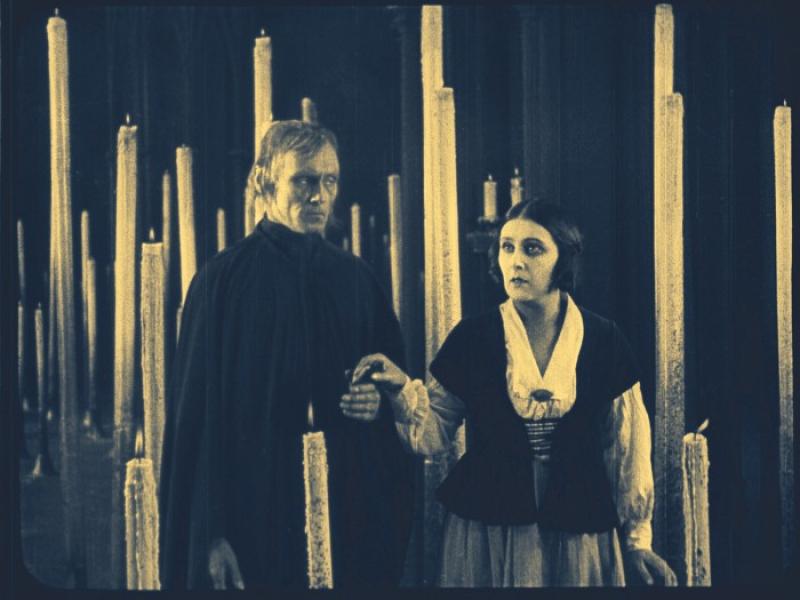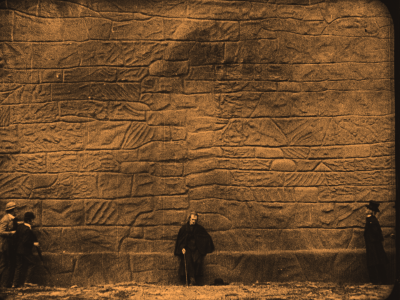DVD/Blu-ray: Der müde Tod | reviews, news & interviews
DVD/Blu-ray: Der müde Tod
DVD/Blu-ray: Der müde Tod
Stunning images and lavish detail in Fritz Lang's four interlinked fantasies

"Weary Death" – "Destiny", the English-language title, is weak by comparison – settles in a small German town, an impressive simulation constructed on a back lot of the Babelsberg Studio outside Berlin.
This is the gist of Fritz Lang's early (1921) "German folksong in six verses", but its format allows for three stories-within-a-story casting far and wide in time and place. Its huge impact on filmmakers since, including Hitchcock, Buñuel and Scorsese, is evident in the imaginative detail lavished on the four tales.
All that, as much the work of the three art-directors as of Lang himself, strikes with startling force and modernity in this loving high-definition 2K restoration now released by Eureka!. The colour tints of the original have not survived, so the approximations are mostly guess-work, but blue for night and red for fire are among the more obvious and effective choices. The restorers also found the original intertitles ingeniously, using calligraphy appropriate to the different settings – Gothic, Renaissance, quasi-Arabic and Chinese – and there's no doubt that the poetic balladeering of the text plays a crucial role.
The screenplay was by Thea von Harbou, at this time Lang’s lover; his first wife, catching them in flagrante, is supposed to have shot herself dead in the bath. In the bath? Yes, it doesn't quite ring true, and suspicions lingered though Lang was released without charge after questioning. He later left Germany for America, having been cuckolded in turn by von Harbou as Wife No. 2, while she became an enthusiastic Nazi collaborator. When she finally saw the film again in 1954, she was so churned up that she fell and broke her hip rushing out of the movie theatre, subsequently dying in hospital.
 Some of this we learn from Tim Lucas’s rather relentlessly knowledgeable commentary, which might have been pruned of some of its cross-references to future films when there's no direct link other than in the critic’s mind. Better is the short booklet essay by David Cairns, which means you would do best to watch the film commentary-free. That entails living with the larger presence of the quirky – mostly wind, brass and percussion-scored – but too often flat and repetitive soundtrack by Cornelius Schwehr. Nothing can dim the unforgettable images, though: the wall which dwarfs even its supernatural builder (pictured above), the steep staircase opening up within it which our heroine, having taken poison, ascends to confront him in a candle-filled room where he gives her a chance – not really an option – to save the three lives in the other stories, the colour-in-monochrome of the wonderful Bakst-like Oriental tableaux and the Chinese fantasy.
Some of this we learn from Tim Lucas’s rather relentlessly knowledgeable commentary, which might have been pruned of some of its cross-references to future films when there's no direct link other than in the critic’s mind. Better is the short booklet essay by David Cairns, which means you would do best to watch the film commentary-free. That entails living with the larger presence of the quirky – mostly wind, brass and percussion-scored – but too often flat and repetitive soundtrack by Cornelius Schwehr. Nothing can dim the unforgettable images, though: the wall which dwarfs even its supernatural builder (pictured above), the steep staircase opening up within it which our heroine, having taken poison, ascends to confront him in a candle-filled room where he gives her a chance – not really an option – to save the three lives in the other stories, the colour-in-monochrome of the wonderful Bakst-like Oriental tableaux and the Chinese fantasy.
Bernhard Goetze is a mighty grim presence as Death, weary of his role but alarming in all his appearances, though the juve lead (Walter Janssen) and his not-so-young girl, star Lil Dagover at loggerheads with Lang, are only fitfully charismatic. The whole, though, is much more than just an interesting precursor to Dr Mabuse, Der Nibelungen, M and Metropolis.
rating
Share this article
The future of Arts Journalism
You can stop theartsdesk.com closing!
We urgently need financing to survive. Our fundraising drive has thus far raised £49,000 but we need to reach £100,000 or we will be forced to close. Please contribute here: https://gofund.me/c3f6033d
And if you can forward this information to anyone who might assist, we’d be grateful.

Subscribe to theartsdesk.com
Thank you for continuing to read our work on theartsdesk.com. For unlimited access to every article in its entirety, including our archive of more than 15,000 pieces, we're asking for £5 per month or £40 per year. We feel it's a very good deal, and hope you do too.
To take a subscription now simply click here.
And if you're looking for that extra gift for a friend or family member, why not treat them to a theartsdesk.com gift subscription?
more Film
 Can I get a Witness? review - time to die before you get old
Ann Marie Fleming directs Sandra Oh in dystopian fantasy that fails to ignite
Can I get a Witness? review - time to die before you get old
Ann Marie Fleming directs Sandra Oh in dystopian fantasy that fails to ignite
 Happyend review - the kids are never alright
In this futuristic blackboard jungle everything is a bit too manicured
Happyend review - the kids are never alright
In this futuristic blackboard jungle everything is a bit too manicured
 Robert Redford (1936-2025)
The star was more admired within the screen trade than by the critics
Robert Redford (1936-2025)
The star was more admired within the screen trade than by the critics
 Blu-ray: The Sons of Great Bear
DEFA's first 'Red Western': a revisionist take on colonial expansion
Blu-ray: The Sons of Great Bear
DEFA's first 'Red Western': a revisionist take on colonial expansion
 Spinal Tap II: The End Continues review - comedy rock band fails to revive past glories
Belated satirical sequel runs out of gas
Spinal Tap II: The End Continues review - comedy rock band fails to revive past glories
Belated satirical sequel runs out of gas
 Downton Abbey: The Grand Finale review - an attemptedly elegiac final chapter haunted by its past
Noel Coward is a welcome visitor to the insular world of the hit series
Downton Abbey: The Grand Finale review - an attemptedly elegiac final chapter haunted by its past
Noel Coward is a welcome visitor to the insular world of the hit series
 Islands review - sunshine noir serves an ace
Sam Riley is the holiday resort tennis pro in over his head
Islands review - sunshine noir serves an ace
Sam Riley is the holiday resort tennis pro in over his head
 theartsdesk Q&A: actor Sam Riley on playing a washed-up loner in the thriller 'Islands'
The actor discusses his love of self-destructive characters and the problem with fame
theartsdesk Q&A: actor Sam Riley on playing a washed-up loner in the thriller 'Islands'
The actor discusses his love of self-destructive characters and the problem with fame
 Honey Don’t! review - film noir in the bright sun
A Coen brother with a blood-simple gumshoe caper
Honey Don’t! review - film noir in the bright sun
A Coen brother with a blood-simple gumshoe caper
 The Courageous review - Ophélia Kolb excels as a single mother on the edge
Jasmin Gordon's directorial debut features strong performances but leaves too much unexplained
The Courageous review - Ophélia Kolb excels as a single mother on the edge
Jasmin Gordon's directorial debut features strong performances but leaves too much unexplained
 Blu-ray: The Graduate
Post #MeToo, can Mike Nichols' second feature still lay claim to Classic Film status?
Blu-ray: The Graduate
Post #MeToo, can Mike Nichols' second feature still lay claim to Classic Film status?

Add comment